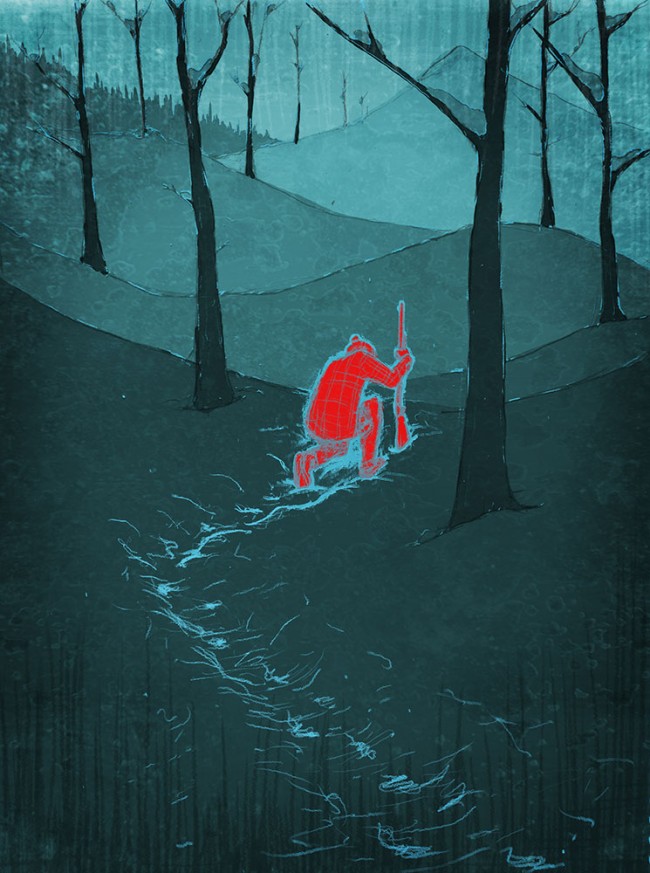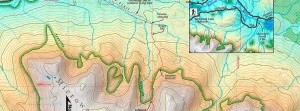
Photo Credit: Facundo Gastiazoro
True Coldness
Thirty-two degrees below zero. Boil the kettle. Make a cup—just water, forget the bag. Step outside onto the deck—careful, it’s icy. Throw the boiling water into the blue sky and watch it instantly burst into steam. It hangs there in the crisp air like powder, or dust. Then it dissipates. Exposed skin tightens as it freezes. Don’t stay out for too long.
It is being on the edge of everything; being in the North, experiencing true coldness, even fleetingly from the deck of a cozy home in a warming climate. Extreme weather can be awe-inspiring or intolerable, depending on how well insulated from it we happen to be. We can develop quite a fondness for something when we don’t really feel it. We turn it into a game, with snowboards and skidoos and mugs of boiling water. Most of us keep ourselves so well insulated during the winter months that we forget to be wary of the cold. It is something for skiers to look forward to and moaners to moan about. We only express concern during a prolonged power cut or when the car starts making funny noises on a road that no one travels along. Coldness isn’t something we want to meet alone.
My partner comes from a family of Steves: four or five generations of them at least. My father-in-law, Steve, likes to tell the story of the time his dad (also Steve) went out hunting one cool January day and didn’t return. Not a great time of year to spend a night under the stars. Steve Sr. was an experienced hunter and when the darkness fell around the house without him, it was obvious that something had gone very wrong.
Steve Sr. was a burly, square-jawed, difficult man. He was content out there in the bush, in the absence of petty everyday conflicts and with a singular goal in mind. His heavy winter hunting gear kept him warm enough while the sun was up and he was moving, comfortable enough that he could forget about the coldness. Head down, he honed in on a set of large hoof prints with telling strides, no doubt left by a moose. He became so focused on searching the ground for the moose’s long gait that he was no longer taking stock of his surroundings. He neglected to leave a breadcrumb trail of mental notes as he passed nature’s subtle landmarks: misshapen trees or rocks or felled logs. He had gone much farther into the forest than he had realized and the tumbling snowflakes quietly concealed his tracks behind him. The coldness turned everything white—the ground, the trees, the sky.
His prey remained elusive. He saw only tracks; no target to creep toward, gun loaded. For all his trouble, he never even got close enough to catch a glimpse of the moose. When he finally lifted his head and thought about turning around, he didn’t recognize his surroundings. His own tracks helped him for a while and he followed them backward until they disappeared under fresh snow. The clean ground provided no hint of which way he had travelled. Each step was a gamble, and the early onset of dusk was unforgiving. The day was done and there was no clear direction home.
Steve Sr. was a smoker and he quickly discovered the only health benefit of his habit. He found a lighter in his pocket, gathered some wood and started a fire. Despite the unrelenting chill and his growling hunger, the first night was bearable. The next day he fell in water up to his knees.
Steve Sr. was a brawler, the product of a cruel childhood, a war and the depression. He had his ways of getting by and those ways weren’t always pleasant. But people like that don’t need quite as much padding as the rest of us do. They just get on with it. Getting wet in low temperatures is a bit like being hit with a hammer—excruciating and almost impossible to think of anything else. Soaked and freezing, he managed to start another fire and he dried off his wet clothes. Then he set off again and walked for hours until his muscles ached and his empty stomach hurt. He found himself at the only familiar place he’d rather not see: the very same spot he’d started at.
The coldness soon bred desperation and confusion. He could be absolutely certain for a while, the way stubborn people can be, that he had corrected his path, but eventually he had to admit that he was nowhere closer to somewhere he knew. By the second night, his discomfort was extreme, dragging exhausted legs with feet frozen and blistered by severe frostbite. He became convinced that he could see a cross in the sky, and he was following it. God was with him, he told himself. The cold was turning him religious.
Other people were risking the elements by then, clocking miles on snowmobiles searching for him as the passing time ate away at his chances of survival. The area he could have wandered into was vast and they had little to go on. Nevertheless, they kept searching.
Dawn broke on the third day. Grit and chance meant he woke with it, puffing out shallow breaths of icy air, broken and delirious. Out of the lonely quiet, he thought he heard a sound. Like the cross in the sky, it was clear enough to him that he could cling onto it and pick himself up out of the snow. It was a distant engine rumbling overhead, and it was getting louder. He was by a lake, and he dragged himself onto the open ice as the plane crossed above him. The pilot spotted his tiny figure stranded in the whiteness. That night, while Steve was recuperating in the hospital, the temperature dipped to -40 C. Had he still been out in the bush, the coldness would certainly have killed him.
Winter climates require a cautious respect to prevent us from going too far and to remind us to go prepared. If we forget our limits, the coldness will punish us for it. Winter roaming is better suited to the moose, while we confine our explorations to comfortable distances from our refuges of warmth.



